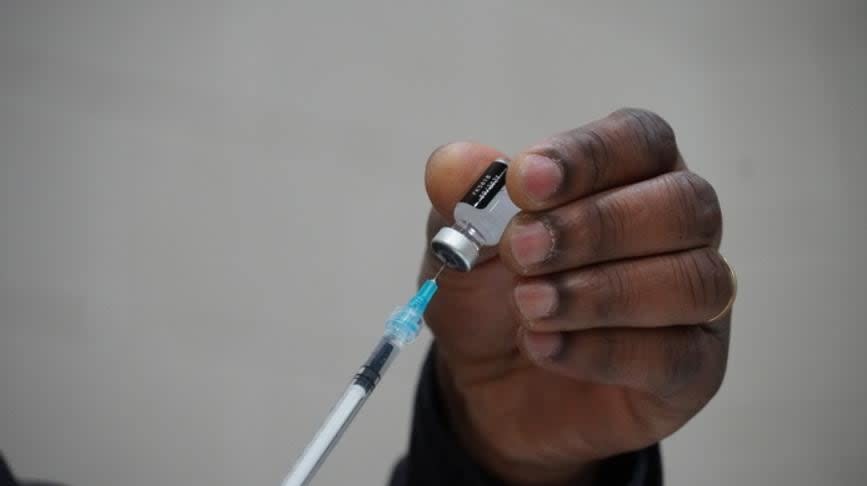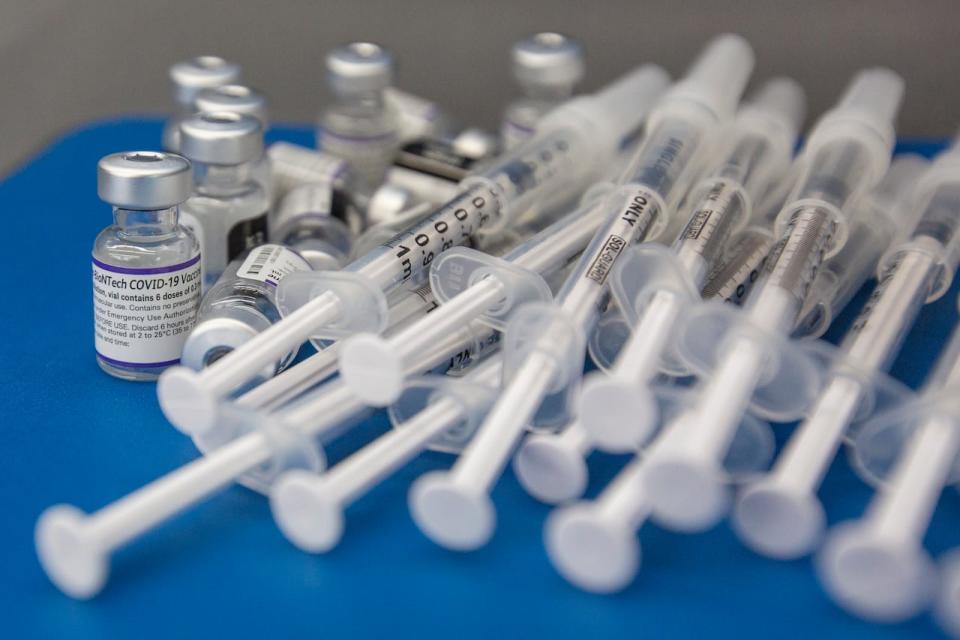Regina pharmacist pleads guilty, reprimanded for administering expired COVID vaccines in 2022

A pharmacist in Regina has been reprimanded for professional incompetence and misconduct after pleading guilty to injecting 15 patients a year ago with expired and incorrect COVID-19 vaccines, according to a decision from the profession's provincial self-governing body.
Gordon Matthews, a pharmacist for nearly 50 years, cannot reapply for admission into the Saskatchewan College of Pharmacy Professionals until he completes certain training courses and pays $9,600 for the investigation and disciplinary hearing into his actions, the college's discipline committee said in a decision dated Oct. 4.
The discipline committee noted Matthews's previously clean disciplinary record, his active participation in the investigation and his guilty plea as mitigating factors in the case, the decision says. However, it found the charges against him "very concerning."
"Administering the correct medication and dose and being aware of the expiry dates of medications are core aspects of a pharmacist's duties and responsibilities," Michael Davis, the committee chairperson, wrote on behalf of the discipline committee.
"Mr. Matthews attempted to protect himself and did not prioritize his patients. Failing to take responsibility for maladministering medication is very serious misconduct and fails to meet the high standards of the profession."
Matthews was hired at a pharmacy in Regina in June 2022, and was terminated on Nov. 29, 2022, after the college received a complaint about his COVID-19 vaccine administration and record keeping on Nov. 20 and 21 of that year.
Matthews hasn't practised since losing his job, nor has he renewed his membership with the college since it expired July 1.
The college received a letter from Kim Masker, Sobeys Pharmacy district manager, on Dec. 6, 2022, stating Matthews had been terminated because he had administered expired monovalent Pfizer vaccines to 15 patients, instead of the requested bivalent Pfizer vaccine doses.
Monovalent vaccines
Monovalent vaccines were the first available to the public during the pandemic, targeting solely SARS-CoV-2, the virus that causes COVID-19. Pharmaceutical companies later developed bivalent vaccines, which target SARS-CoV-2 and the more transmissible Omicron variants BA.4 and BA.5.
The vaccine uses mRNA, which tells the body to produce proteins that resemble the virus so the immune system recognizes a foreign agent and builds antibodies to protect itself.
The mRNA component has a shorter shelf-life than the other contents of the vaccine, and must be stored at a specific temperature, Ekaterina Dadachova, a University of Saskatchewan pharmacy and nutrition professor, told CBC News in an email.
While someone who received an expired dose would be unable to develop a full immune response to the virus, there wouldn't be any additional health risk, Dadachova said.
The pharmacy in question stored vaccines in a box in its refrigerator. When doses of monovalent Pfizer vaccine expired, the pharmacy would mark the box with a bright red label indicating the expiry date, send a report to the provincial health ministry and the vaccines would be discarded, the decision says.
It is unclear whether the box from which Matthews drew was marked, but it had not been disposed of due to "a number of issues" at the pharmacy, including tech problems and low staffing, the document says.
Matthews didn't testify, but if he had, the decision says, he wouild have said he thought it was the correct box and didn't notice an expiry label.
He administered the proper dosage to each patient, but he documented on vaccine screening and consent forms that he injected more than he was supposed to.

The monovalent vaccine solely targets the novel coronavirus that causes COVID-19, while the bivalent dose targets the novel coronavirus and the Omicron variant. (Lars Hagberg/The Canadian Press)
On Nov. 21, 2022, another staff member found Matthews had administered the wrong vaccine, then informed him and the pharmacy manager.
After learning of his mistake, Matthews noticed empty vials had been removed from the garbage by another pharmacist while they investigated the error. He picked up the vial, looked at it, then threw it into the garbage.
Matthews would have testified that the investigation was over, so he was tossing an empty glass bottle into the garbage, the decision says.
Matthews changed vaccine ID numbers
Another person also recognized Matthews had administered the expired vaccine, then changed the recorded lot number from the monovalent dose that had been given, to the bivalent dose that wasn't, the decision says.
The drug identification number (DIN), which uniquely identifies all drugs sold in dosages in Canada, and the expiry dates were not printed on the COVID-19 vaccine vials in question. Matthews asked for those numbers from another pharmacist and wrote them down, referring to them to complete documentation.
On Nov. 20 and 21 of last year, he did not update those numbers on his note, "or otherwise make himself aware of the correct numbers," the decision says, which led to him using outdated information on documents and in the electronic system.
Matthews changed the numbers on several vaccine screening and consent forms to correspond with the bivalent vaccine, when he had been made aware of his mistake. Those changes were not uploaded to the electronic system, the decision says.
Had he testified, Matthews would have said that he thought he had administered the correct vaccine, but mistakenly listed outdated information, the decision says.
The pharmacy in question has since reviewed and bolstered its procedures regarding vaccine storage and disposal, such as ensuring two pharmacists verify a vaccine to be given is not expired and that it is the correct one, the decision says.
Sanction must send message: committee
The discipline committee felt a sanction against Matthews had to show "this kind of behaviour will be not be tolerated," the decision says. It would have to be stiff enough to deter similar conduct from pharmacists in general, as well as maintain public confidence.
A guilty verdict and a reprimand demonstrate the seriousness of Matthews's misconduct and could harm his reputation, the decision says.
Forcing Matthews to re-complete certain injection training and certification, as well as receive an "unconditional pass" in an ethics course, before he can practise again would address the committee's concerns and the misconduct in this case.
Matthews is also liable to pay for the investigation and hearing by Feb. 24, 2025, the decision says.
If he doesn't pay up by that time, but is a member in good standing, then the college will suspend his licence until he pays what's owed.He didn't intend to retire when the incident occurred, but he decided to not renew his membership because of the disciplinary proceedings, the decision says.
He was unsure whether he would renew at the time of the hearing, it adds.


